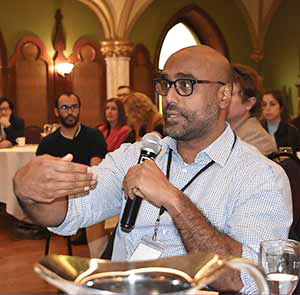Meeting of the minds

It’s the same story – another drug trial to treat the symptoms of neurodegenerative diseases fails yet again.
Researchers have long been stumped on how to help those with devastating incurable diseases including Alzheimer’s and Parkinson’s. Even with decades of research, promising treatments in the lab have a failure rate of more than 90% when translated to the clinic.
Every year, millions of dollars are invested in developing drugs for the lab without evaluating their impact on cognition, the mental processes that allow us to carry out everyday tasks, solve problems, make decisions and interact with our surroundings. Since cognition is fundamental to what makes us who we are and is often impacted by a neurodegenerative disease, this early omission ultimately leads to drugs that do not work in humans.
To change the way drugs are tested for neurodegenerative diseases, neuroscience researchers supported by Western University’s BrainsCAN and McGill University’s Healthy Brains, Healthy Lives (HBHL) initiatives, are developing a method to make drug testing more affordable, efficient and translational. Through the Initiative for Translational Neuroscience (ITN) therapeutics project, researchers will create a multi-step procedure to better evaluate the performance of drugs during lab testing.
“Our goal is to establish a clear path forward for a novel way to test new drugs,” said Mallar Chakravarty, scientific co-lead for the ITN therapeutics project and Director of the Cerebral Imaging Centre and the Neuroinformatics Platform at the Douglas Research Centre. “Our work seeks to establish promising leads so that we will be able to identify drugs with best potential for moving to clinical trials in humans.”

Mallar Chakravarty, scientific co-lead for the ITN therapeutics project, asks a question to a panel during the inaugural meeting (TRIDENT photo)
Earlier this month, Western and McGill researchers held an inaugural meeting with leaders from academia, private, public, and philanthropic sectors to discuss methods for drug testing that will work across all sectors.
The two-day meeting held at McGill centered on the BrainsCAN-HBHL ITN therapeutics project supported by the Canada First Research Excellence Fund (CFREF), and the Western-led TRanslational Initiative to DE-risk NeuroTherapeutics (TRIDENT) project, supported by the federal New Frontiers in Research Fund (NFRF). Researchers were joined by leaders from pharmaceutical companies, Brain Canada, Krembil Foundation, BioGene and the Canadian Institutes of Health Research (CIHR).
“This idea of accelerating drug discovery and working in partnership with the private sector and with donors only works if we can bring people together and talk about it,” said Chakravarty on the importance of the multisector meeting.
The goal – use the expert feedback from the meeting to build a drug testing pipeline plan at the onset of the project. The pipeline will include innovative brain imaging techniques, disease-specific animal models and translational cognitive tests for memory, learning and behaviour.
Conversations on the first day focused on models of cognition and imaging as biomarkers. The latter half of the day explored public-private sector partnerships and their role in drug discovery. The second day was an open discussion on TRIDENT’s expansion of the ITN therapeutics pipeline.
“We need to not only understand ourselves well, but also our current and potential partners in industry,” said Marco Prado, scientific co-lead for the ITN therapeutics project and professor at Western’s Schulich School for Medicine & Dentistry. “This meeting is a significant step in integrating all of the components and expertise together.”
Together, the ITN therapeutics project and TRIDENT will revolutionize drug development for brain diseases and accelerate the drug discovery process. Ultimately, the aim is to quickly identify drugs for neurodegenerative diseases that will be successful in human trials and help those suffering from brain diseases.
For more information, visit https://itn.neuroimpact.ca/.






